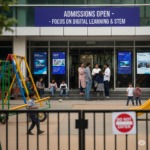
Encouraging Parents to Value Education as a Journey of Learning, Not Just Job Placement
Shaping a Future of Thinkers: Why Education Should Be About Growth, Not Just Employment
Bengaluru, 2025 — In India’s rapidly evolving socio-economic landscape, the purpose of education often gets reduced to securing a high-paying job. For many parents, a good education is synonymous with job placement. However, schools, educators, and policymakers are increasingly emphasizing the importance of viewing education as a lifelong journey of learning rather than just a means to an end.
The challenge lies in shifting parental mindsets to recognize that education’s true value lies in personal growth, creativity, and critical thinking, which ultimately lead to success in various walks of life, including employment.
Why Parents Focus on Job Placement
The emphasis on job placement in education is deeply rooted in India’s socio-economic realities:
- Financial Stability: For families, especially those in lower-income groups, education is seen as a ladder to economic security. A well-paying job is often considered the ultimate goal of years spent in school or college.
- Cultural Expectations: Social pressures and community norms often equate success with conventional career paths such as engineering, medicine, or government jobs.
- Rising Competition: The intense competition for limited job opportunities forces parents to push their children into streams and institutions known for placement success, often ignoring their child’s individual talents and interests.
According to a report by the National Sample Survey Office (NSSO), 65% of Indian parents prioritize job placement as the primary purpose of education, with only 25% seeing education as a tool for holistic development.
The Pitfalls of a Placement-Focused Approach
This narrow focus on job placement often undermines the broader benefits of education, such as creativity, adaptability, and emotional intelligence. Graduates trained solely for jobs may struggle to innovate or adapt in a rapidly changing job market, where automation and AI are reshaping industries.
- Mental Health Concerns: The pressure to secure high-paying jobs can take a toll on students’ mental health. The National Institute of Mental Health and Neurosciences (NIMHANS) reports a 30% rise in anxiety and depression among students driven by career-related stress.
- Lack of Life Skills: A placement-focused education often neglects essential life skills such as teamwork, communication, and critical thinking.
- Missed Opportunities: Students pushed into traditional career paths may miss the chance to explore their true passions, leading to dissatisfaction in their professional lives.
Promoting Education for Learning: A New Perspective
Schools and educators are working to shift this narrative by highlighting the value of holistic education and lifelong learning:
1. Focusing on Skill Development
Modern schools like Amity International and Vidya Valley School emphasize skills such as problem-solving, emotional intelligence, and leadership. These skills not only prepare students for diverse careers but also foster confidence and adaptability.
2. Introducing Flexible Curriculums
Institutions are adopting interdisciplinary approaches, allowing students to combine fields like arts and technology or economics and psychology. The National Education Policy (NEP) 2020 encourages this flexibility, giving students the freedom to pursue their interests.
3. Engaging Parents Through Workshops
Schools like Delhi Public School are hosting regular workshops to educate parents about the importance of skills, creativity, and lifelong learning. These sessions showcase the growing demand for soft skills and creative thinking in global job markets, helping parents see the long-term benefits of holistic education.
4. Career Counseling for Families
Career counseling programs for both students and parents are being introduced to highlight unconventional career options and emphasize that success is not limited to traditional jobs. Schools are showcasing alumni who have excelled in creative, entrepreneurial, or socially impactful careers.
The Role of Parents in Shaping Educational Values
Parents are pivotal in this shift. Here’s how they can support and encourage education as a learning journey:
- Recognize Individual Talents: Understand and nurture your child’s unique strengths rather than imposing predefined career goals.
- Value Process Over Outcome: Focus on the knowledge, skills, and growth your child gains during their education, not just the final job offer.
- Embrace New Career Trends: Learn about emerging fields like digital marketing, AI, and sustainable design that prioritize creativity and innovation over traditional academic performance.
Real-World Success Stories
- Coding at an Early Age: A student from Bright Future Academy, Bengaluru, started coding at 12 and developed an app to help farmers track weather changes. This passion-driven project led to scholarships and internship offers, showcasing that education rooted in curiosity can lead to tangible outcomes.
- Social Innovation: A graduate from Ashoka University combined economics and sociology to create a startup focusing on rural employment, proving that interdisciplinary learning can drive both personal and societal impact.
Government Initiatives Supporting This Shift
The Indian government is playing a vital role in encouraging a broader view of education:
- National Education Policy (NEP) 2020: Aims to reduce rote learning and introduce skill-based curriculums.
- Samagra Shiksha Abhiyan: Provides funding for extracurricular activities and vocational training to develop well-rounded students.
- Startup India Programs: Support student entrepreneurs by funding projects rooted in innovation and community impact.
Overcoming Resistance
Shifting parental mindsets is not without challenges:
- Cultural Barriers: Many parents still view unconventional career paths with skepticism.
- Economic Constraints: Families in lower-income groups often see immediate job placement as the primary goal due to financial pressures.
- Legacy Thinking: For generations, education has been equated with financial security, making it difficult to adopt new perspectives.
Schools and policymakers need to address these barriers through consistent communication, community engagement, and showcasing the long-term benefits of a learning-focused education.
Conclusion
Education is not just a tool for securing employment—it is the foundation for intellectual curiosity, personal growth, and societal progress. By encouraging parents to value education for learning, schools can unlock their students’ full potential, enabling them to thrive not just in careers but in life.
The journey from seeing education as a job factory to embracing it as a lifelong process of growth is a challenging but necessary shift for India. When parents, educators, and policymakers come together to champion learning, the nation can nurture a generation of innovators, thinkers, and leaders who are equipped to tackle the challenges of an ever-changing world.




